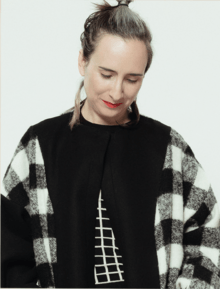Carla Fernández
Carla Fernández Tena (born January 29, 1973), known as Carla Fernández, is a Mexican fashion designer from Saltillo, Coahuila, based in Mexico City. She has gained international recognition for her precise approach to documenting and preserving the rich textile heritage of Mexico's indigenous communities by transforming it into abstract contemporary clothing, and proving that tradition is anything but static.[3]
Carla Fernández | |
|---|---|
 Carla Fernández | |
| Born | January 29, 1973 |
| Nationality | Mexican |
| Education | Universidad Iberoamericana, Mexico |
Label(s) | Carla Fernández |
| Awards | Young Fashion Entrepreneur in the Year 2008 by the British Fashion Council, ID 2009 presented her as one of the 40 best designers of the moment internationally,[2] Prince Claus Fund Award 2013 |
Early life and career
Since her childhood, Carla Fernández has been a fan of Mexican culture. Her father is a historian and he traveled to indigenous communities, while her mother visited international fashion centers. Fernández discovered the wealth and potential of Mexican textiles and designs. Her background in art history and fashion design allowed her to study the indigenous dress from a different angle to the anthropological.
With the experience of having worked for Conaculta and Fonart, promoting design and development of craft techniques in indigenous communities, she shaped her knowledge in art history from the Universidad Iberoamericana and was named one of the "50 People that move Mexico" by Quién magazine.[4][5]
Brand
Through her ready-to-wear collections, books, and exhibitions, designer and entrepreneur Carla Fernández is blending traditional textiles with avant-garde techniques to create a new look for Mexico's style mavens.
Along with her eponymous line of ready-to-wear clothes — which Fernández began in 2000 and which is inspired by traditional Mexican textiles and geometric patterns — Fernández is the head of Taller Flora, a mobile design laboratory that brings together Mexican designers and indigenous artisans to create lines of couture and ready-to-wear garments. Their goal is to show the world an at once modern and ancient Mexican style that pushes the boundaries of fashion while remaining true to its roots.
Her proposal is contemporary and edgy with a warm and intellectual touch at the same time. This style is the result of 15 years of experience studying the Mexican Apparel, perceiving in it a striking design potential. Her line takes its roots in the same way that the French make their fashion inspired by royalty or the Japanese in the Kimono. The brand garments reflect the sophisticated system of indigenous clothing based on the use of the square and rectangle, and works to create contemporary garments that give a new dimension to the body and break the stereotypes that are exported to Mexico. The reinterpretation of this complex system, and working directly with artisans, is the hallmark of the brand, for which the tradition is not static fashion.[6]
In response to the COVID-19 pandemic, Fernández teamed up with ten artisans from Michoacan, Colima, Oaxaca, Chiapas, and Guerrero to make ecological face masks based upon traditional wooden masks.[7]
Exhibitions
- "The Barefoot Designer: A workshop to Unlearn" - Museo Jumex, Mexico City - 2016 [8]
- "The Future is Handmade! Fashion + Art + Home" - Red Desert, Downtown Los Angeles CA - 2015
- "Design. Culture. Mexico" - Boiler Room at Heath Ceramics - 2015
- "The Barefoot Designer" - Isabella Stewart Gardner Museum - 2014
- "Design from 5 Continents" - The New World UK [9]
- Museum of Craft and Folk Art[10]
- Cultural Centre Spain[11]
- Cultural Agents Harvard[12]
- Musac Spain [13]
- Ethnical Fashion Show Paris[14]
- "Carla Fernández: Stitching Communities" - MIT[15]
Awards and recognitions
The brand has been recognized simultaneously by two strengths: being at the forefront of design and a business model for its social vision. Fernández was awarded the international prize Young Fashion Entrepreneur in the Year 2008 by the British Fashion Council and the magazine ID in 2009 presented her as one of the 40 best designers of the moment internationally. Moreover, the revolutionary idea of craft-industrial production has been exhibited in lectures at universities such as Harvard, MIT, Fashion Institute of Technology (FIT), Universidad Iberoamericana and the Institute of Contemporary Arts in London.
Her designs have been published in several books, including Fashioning Fabrics by Sandy Black and The Air is Blue by Hans Ulrich Obristy. Among the fashion publications in which her work has appeared are ELLE, Vogue, In Fashion, ID, Harper's Bazaar and Wallpaper. Mexican newspapers, including Reforma and Excelsior, have recognized the brand and highlighted its main strength, which is that it has a product with creative and original design, able to interweave past and tradition, artisans and designers to fashion and its future.
References
- "Carla Fernández: Prince Claus Fund". Archived from the original on 2015-03-03. Retrieved 2014-09-29.
- "Carla Fernández Taller Flora". Archived from the original on 2014-10-06.
- "Carla Fernández: The Barefoot Designer: A Passion for Radical Design and Community". Archived from the original on 2014-10-04. Retrieved 2014-09-29.
- "Carla Fernández: Mexico Fashion Week". Archived from the original on 2014-09-29.
- "Los 50 personajes que mueven a México". Archived from the original on 2010-10-31. Retrieved 2014-09-29.
- "Taller Flora". Archived from the original on 2014-09-29.
- "Mexican designer collaborates with artisans to create ecological masks". El Universal (in Spanish). 12 July 2020. Retrieved July 14, 2020.
- "The Barefoot Designer Exhibition". Archived from the original on 2016-04-19. Retrieved 2016-04-19.
- "Design from 5 Continents".
- "Invitados de Lujo en México".
- "Cultural Centre Spain".
- "Cultural Agents Harvard". Archived from the original on 2016-03-04.
- "MUSAC Spain".
- "Ethnical Fashion Show".
- "Stitching Communities".
External links
- "Fashion Culture: The Mexican Fashion Revolution, Carla Fernandez" from Archive on Demand